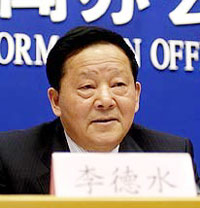|
China's 2004 GDP ranks 6th in world economy
(Xinhua/chinadaily.com.cn)
Updated: 2005-12-20 10:34
China on Tuesday revised its GDP in 2004 to US$1.93 trillion, which means the country has overtaken Italy to rank 6th in world economy.

De Deshui, director of the National Bureau of Statistics. |
The country's top statistician Li Deshui made the announcement at a press conference of the Information Office of the State Council, citing the result of a national economic survey.
Li said China's gross domestic product figure for 2004 to 15.9878 trillion yuan (about US$2 trillion), up 2.3 trillion yuan, or 16.8 percent from the preliminary figures.
He said that the economic census results will not affect the nation's macro-economic policy. The changes in the figures do not mean the traditional statistics mislead China's policy making.
"The revised statistics show that China's economic structure is more reasonable and healthy than the previous figures showed," Li said.
Li said the gap to catch up with the fourth and fifth economies -- France and Britain -- is "narrowing." But Li admitted that China's per-capita GDP is still very weak, ranking behind the 100th in the world economies.
The tertiary sector, covering services from pavement foodstalls to teaching and accounting, accounted for 93 percent of the revision and now made up 40.7 percent of the economy instead of 31.9 percent previously, the economic census found.
The data could have far-reaching effects on social and economic policymaking, showing that restaurants, retailers, real estate firms and other service businesses make up a much bigger share of China's economy than previously thought.
The GDP share of the secondary sector - industry, manufacturing and mining -- fell to 46.2 percent from 52.9 percent. The share of the primary sector -- farming, forestry and fisheries -- shrank to 13.1 percent from 15.2 percent.
"The economic census helps to verify and make up for the service activities that were not covered before, so that the structure of the three industries is more consistent with the actual situation in China and more in line with the general level of developing countries," the NBS said in a statement.
"An abundance of detailed data was obtained, which can truly reflect the achievements made and national strength gained since China adopted the reform and opening up programme," according to the NBS statement.
Li said China had long been using the Material Product System (MPS) which was developed under the centrally-planned economic system in its national account statistics until the 1980s, resulting in "very weak" statistics for the service sector.
Along with the economic reform, China has seen a diversified economic development in terms of ownership, and in particular, a dynamic development of private and individual-run service activities.
"It is very difficult to conduct statistical surveys as they are very scattered with frequent changes, resulting in a certain degree of under-coverage," said Li.
While many new services are mushrooming, data on their activities are often underestimated, he acknowledged.
Li said the share of the primary industry was still based on the figure from the annual preliminary estimation, as the industry was not covered in the survey.
|